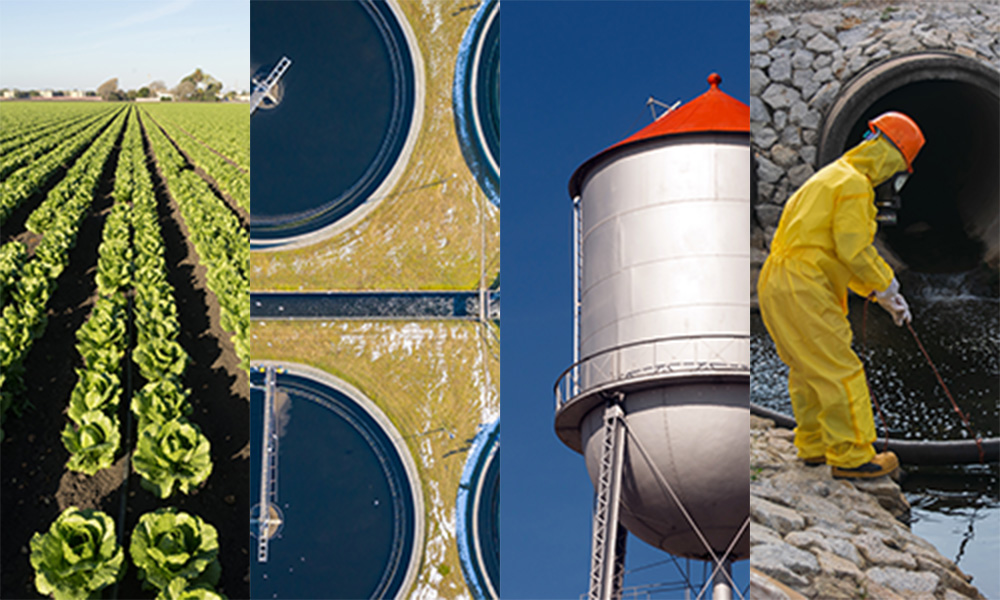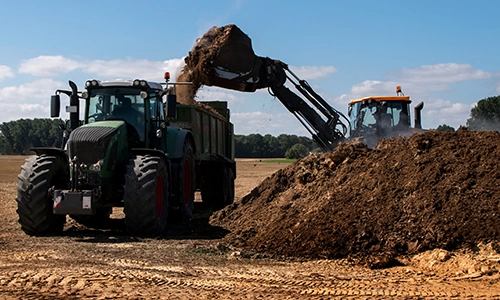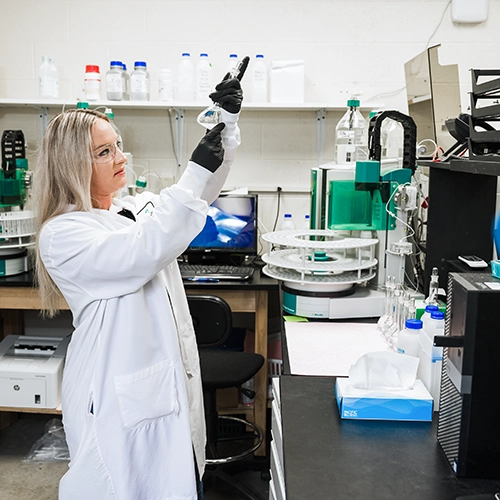What Are Biosolids?
Biosolids are a byproduct of the wastewater treatment process. During wastewater treatment, liquids are separated from solids. Sometimes referred to as sewage sludge, these solids are treated physically and chemically to produce a semisolid, nutrient-rich product known as biosolids. It’s estimated that as much as 50% of biosolids produced in the U.S. are land-applied as soil amendments in agriculture.
By monitoring and managing biosolids, Pace® helps clients minimize potential risks, such as the contamination of soil or groundwater, while maximizing the beneficial use of biosolids in applications such as agriculture, forestry, and land reclamation.
Pace® Biosolids Analysis Portfolio
Assesses the level of essential nutrients, such as nitrogen, phosphorus, potassium, calcium, magnesium, and sulfur, which are conducive to plant growth.
Identifies and quantifies the presence of heavy metals, such as arsenic, cadmium, chromium, copper, lead, mercury, nickel, selenium, and zinc, in biosolids.
Determines the level of specific synthetic chemical contaminants, such as Per- and Polyfluoroalkyl Substances (PFAS), in biosolids.
Detects and measures the presence of pathogens, such as fecal coliform, Salmonella, and enteric viruses.
Identifies and quantifies the presence of organic compounds, such as polychlorinated biphenyls (PCBs), polycyclic aromatic hydrocarbons (PAHs), and pesticides.
Identifies characteristics, such as moisture content, total solids, volatile solids, and particle size.
Industries We Serve
Analyzing biosolids helps ensure they meet regulatory standards and are safe for land application. Analysis can assess the level of essential nutrients, such as nitrogen, phosphorus, potassium, calcium, magnesium, sulfur, and micronutrients, which promote plant growth. Additionally, analyzing biosolids helps identify and manage potential risks, such as the presence of heavy metals or pathogens. Proper analysis of biosolids contributes to improving soil quality, increasing water-holding capacity, and reducing wind and water erosion.
A valuable resource, biosolids can be recycled and land applied as a soil amendment, providing a potential revenue stream for wastewater treatment facilities. But whether sold as soil amendments, incinerated, or disposed of in landfills, it is crucial for wastewater treatment facilities to analyze their biosolids to ensure they meet regulatory requirements and to minimize the risks posed to the environment and public health.
Forensic analysis of biosolids produced by wastewater treatment can help municipalities and other regulatory bodies spot issues early, identify pollution sources, and promote public health and safety. Regular testing also helps municipalities demonstrate their commitment and maintain public trust in their stewardship of the community.
Environmental consultants get involved in a variety of projects, from site assessment and remediation to risk mitigation, that may require the analysis of contaminant levels in biosolids. These analyses can help consultants make informed recommendations, such as the best practices for land application of biosolids or biosolids disposal.

Biosolids Regulations
Biosolids can be a valuable resource in agriculture, forestry, and land reclamation projects due to their high nutrient content and soil conditioning properties. However, since biosolids can contain pollutants and pathogens, disposal and land application of biosolids are strictly regulated to protect public health and the environment.

The CWA is the primary federal law regulating the discharge of pollutants into the nation's surface waters, including biosolids. The 503 Rule and the National Pollutant Discharge Elimination System (NPDES) were developed under the auspices of the CWA.
The 503 Rule, also known as "Standards for the Use or Disposal of Sewage Sludge," sets pollutant concentration limits, pathogen reduction standards, and management practices for the safe use and disposal of biosolids. Open dumping of biosolids is prohibited, and incineration is subject to strict limitations, including emissions controls and monitoring requirements. Additionally, biosolids must meet certain pollutant concentration limits and pathogen reduction standards before being disposed of in landfills or surface disposal sites.
Developed under the CWA, the National Pollutant Discharge Elimination System (NPDES) is a permitting program designed to regulate the discharge of pollutants into the waters of the U.S. (WOTUS). The primary focus is on wastewater discharge, but increasingly, biosolids are part of the permitting and reporting process. Treatment works that meet applicability requirements and either land apply, surface dispose, or incinerate sludge are required to submit an annual report to their permitting authority by February 19 of each year.
States may regulate biosolids within their jurisdiction, but these restrictions must be equal to or more stringent than the federal biosolids rules established by the U.S. EPA. State regulations typically cover permitting and land application of biosolids, pollutant limits, pathogen reduction requirements, and monitoring of heavy metals and other contaminants.
Why Select Pace®
The largest American-owned environmental lab in North America, Pace® has a well-established reputation for delivering fast, reliable analytical services to a wide range of customers, including government agencies, industries, and environmental consultants. By leveraging our expertise, advanced analytical techniques, and cutting-edge instrumentation, we ensure that the data generated is accurate, reliable, and defensible.
Our comprehensive service offerings, including project planning, sampling, and data interpretation, make Pace® the go-to resource for customers seeking to comply with environmental regulations or assess and mitigate the impact of contaminants in biosolids on the environment.

Additional Resources
Need to find a lab that can handle your unique requirements?
Contact us directly or download our list of environmental certifications across our network.